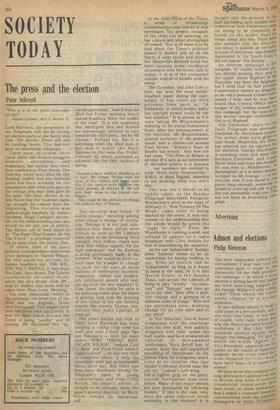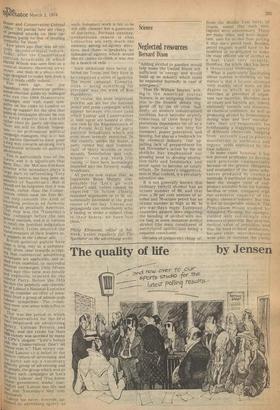Advertising
Admen and elections
Philip Kleinman
The most memorable political advertisement I ever saw was the television spot — made by the Democrats for the 1968 presidential campaign — in which a voter entered a polling booth and Pulled the lever indicating support for the George Wallace-Curtis LeMaY ticket. Upon which the whole world erupted in a nuclear explosion. It was skilfully filmed, it made 3 valid point in a few seconds, and it was very, very funny. It was a150' of course, very rude, which waS why the Democrats were forced to withdraw it. But they didn't withdraw another equally rude' though less damaging, TV spot which the words 'Agnew f°r Vice-President' appeared on the! screen to the sound of hysterica laughter. As the words faded theci were replaced by "i his won) have been funny if it weren't s° serious." Writing about this campaign not, long afterwards I pointed out that in Britain that kind of politica' 'commercial' would never have been made, let alone withdraWn. And I added a comment based on conversations with the publicity managers at both TransPort House and Conservative. Central Office: "All parties here are chary of personal attacks on their opPonents, partly for fear of creating sYmpathy for them."
Five years ago that was an entirely uncontroversial remark. Today, after the Conservative
election broadcasts in which Harold Wilson was seen first as a comical dummy throwing away Money, and then in a photo-montage designed to make him look a fool, it reads oddly indeed.
Five years ago, too, Joe Napotitan, the American profes sional election publicity manager
Who ran the 1968 Democratic Campaign, met with scant sym
Pathy on his visits to London to drum up support for the idea that Political campaigns should be run bY hired experts like himself rather than by party ideologues. There are still no British Napoli tans no professional political
campaign managers, that is — but the parties themselves have gone a long way towards adopting Joe's hard-boiled attitude to political advertising. This is particularly true of the Tories, and it. is significant that
Barry Day, the McCann-Erickson
u, 'rector who nowadays plays a large part in influencing Tory Publicity tactics, has long been an should of Napolitan's. But it 'ruould not be forgotten that it was 'abour, rather than the Conser vatives, which took the first British step towards the kind of knocking political ad formerly .,,regarded as peculiarly American. Lhat step was the 'Yesterday's en campaign before the last general election, and it is curious With recall the horrified indignation with which Tories received the Itansformation of their leaders inlo Puppets in the Labour ads.
British political parties have
c,orrie a long way in a comparative]
, Y short time towards accept
ing that commercial advertising ,lechniques are applicable, and in deed even essential, to successful Political campaigns. Only fifteen Years ago this view was totally rd explicitly rejected by. the eiabour Party. Before the 1959 t:btion the publicity sub-committee of Labour's National Executive Itbet to consider an offer of assist:ice from a group of admen with , hour sympathies. The volun i their were sent away with a flea n
ear.
the was the period in which t'.'e Conservatives for the first ainle employed an advertising vg,enoY, Colman Prentis and jo'lleY, and the credit for their
victory was ascribed by many
CPV's slogan: "Life's better With the Conservatives. Don't let Labour ruin it," That victory converted Labour to a belief in the Positive virtues of advertising and 0.1„e Party set up a voluntary golicity group of advertising and People, the group which was to r°duce such campaigns as 'Let's t°a,vvith Labour' and 'You know e 'oour government works' (sucsressful) and 'Labour has life and s,,411' and 'Yesterday's Men' (un such. Voluntary work is felt to be not only cheaper but a guarantee of sincerity. Perhaps another, unexpressed reason is that Labourites are very much the minority among ad agency directors, and there is probably no substantial agency which would like its clients to think it was run by a bunch of reds.
Such inhibitions have never affected the Tories, and they have in fact employed a series of agencies. The recent campaign 'Conservatives — doing something for everyone' was the work of Roe Humphreys.
Of course, the most important political ads are not the national poster and press campaigns which appear between elections (and which Labour and Conservatives at least agree are banned at election time by the Representation of the People Act) but the party political broadcasts which are even more severely restricted. In this country, unlike the States, a party cannot buy spot 'commercials' of thirty seconds or sixty seconds. Nevertheless spot techniques — vox pop, sharp film cutting — have been increasingly imported into the formerly stodgy broadcasts.
All parties now realise that, as copywriter Brian Murphy (responsible for 'Let's go with Labour') said, voters cannot be expected "to follow closely reasoned arguments or to be automatically interested in the great issues of the day. Unless our propaganda can immediately echo a feeling or strike a subject close to their hearts, we have lost them."
Philip Kleinman, editor of Adweek, writes regularly for The Spectator on the advertising scene.

































 Previous page
Previous page